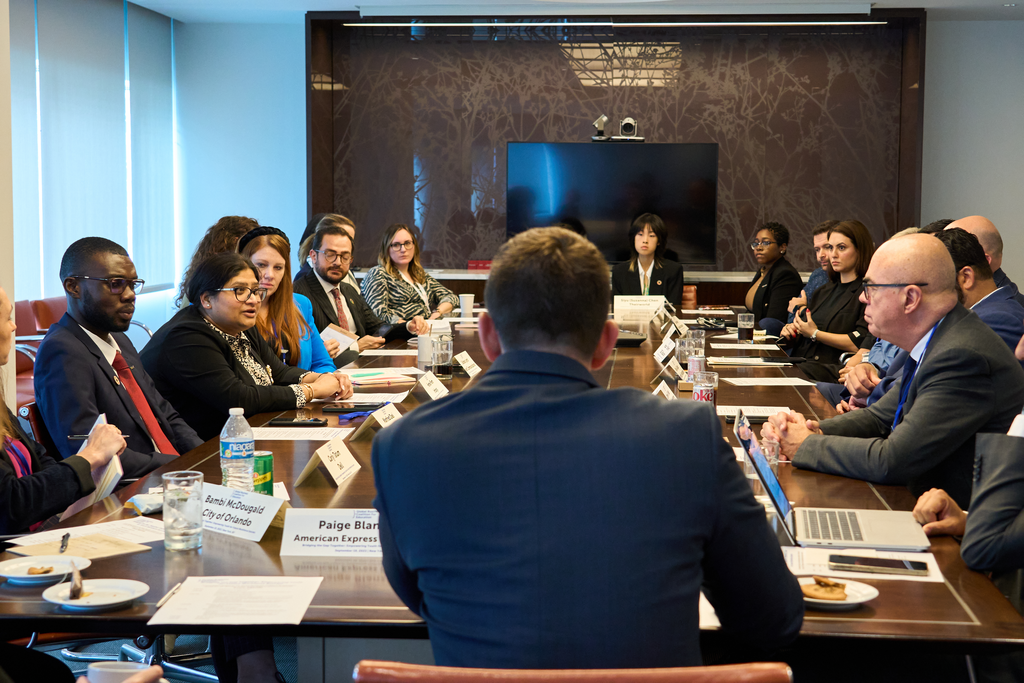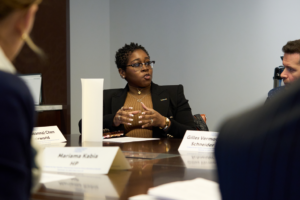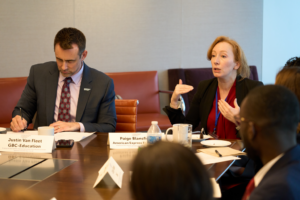
Businesses and philanthropy join youth in boosting skills training

Executives, philanthropy leaders and young people met with us in a challenge to prepare the next generation for good jobs.
When businesses, government and philanthropy join with youth, they can find innovative, effective ways to recruit young people to jobs and re-train employees for better jobs. Such collaborations are especially important for underserved people who lack the traditional credentials or connections.
That was the consensus of a roundtable of executives, foundation leaders and youth that our team at the Global Business Coalition for Education hosted during September’s U.N. General Assembly in New York. We were pleased to have thoughtful participants from HP, IBM, Deloitte, Dell Technologies, the American Express Foundation and others.
“The skills gap continues to widen across the world,” said Justin van Fleet, executive director of the Global Business for Education, as he opened the discussion.
He noted that by 2030, half of all young people will lack the fundamental skills to participate in the workforce. Already, companies in industries from manufacturing to healthcare report challenges in recruiting and retaining employees. For that reason, we called the roundtable “Bridging the Gap Together: Empowering Youth for Future Workforce Success,” with an emphasis on together.
Van Fleet explained that we wanted to identify possible partnerships and opportunities to deepen our work while sharing practical solutions to the shortages in the talent pipeline that are stymying businesses. And we wanted to include the voices of young people, including our Global Youth Ambassadors, who are helping to shape the future of education.
One of those young people was Tyra Gravesande of New Jersey. “In this work, it’s crucial to listen to our voices, understand our concerns and involve us in the decision-making process,” Gravesande said.

Tyra Gravesande, one of our Global Youth Ambassadors, exhorts companies to do more for underserved youth.
Much of the discussion focused on creating onramps to the workforce for disadvantaged youth who don’t have family connections or traditional college credentials. Several of the businesses mentioned initiatives to recruit young people who have the right skills, rather than a diploma.
The speakers offered an array of suggestions, based on their successes in organizing training programs, internships and apprenticeships. We heard that well-intentioned opportunities often fail to reach youth who most need these jobs—unless nonprofit groups and educators are involved in rec helping these young people apply for and get these opportunities.
We heard some unusual observations that many of us overlook — including a warning about the effect of climate change on aging workers who spend every day toiling outdoors.
Some highlights:
- Carly Tatum, senior director, giving and impact, Dell Technologies: Make sure young people get hands-on experiences. For example, schools can involve students in running an IT help desk.
- Mariama Kabia, digital equity accelerator lead, HP: Consider a corporate goal focused on reaching more people through mentorship.
- Paige Blansfield, program officer, American Express Foundation: Training doesn’t stop with hiring someone; employees need to see a career path and ways to move along that path.
- Gravesande and our other youth ambassadors: Companies should view disabled young people as an untapped talent pool that needs better access to opportunities:
- Jeffrey R. West, executive director, Education to Employment (E2E) Partners, in Corpus Christi, Texas: Develop an internship portal with groups like the chamber of commerce, offer job-shadowing opportunities so students can see the daily realities of an occupation.
- Bramley Crisco, director of talent, Action Greensboro (North Carolina): Encourage corporations to focus initially on local training, working in their backyard with nonprofit organizations. She added that employers in places like Florida need to realize that climate change is affecting workers who are outdoors; as they age, they might want to retrain so they can transition to jobs indoors.
- Bambi McDougald, program manager, City of Orlando (Florida): Develop meaningful apprenticeships to replace people in all sorts of jobs as the public and private sector workforce reaches retirement age; make sure government and private sector coordinate this training.
A note about those last three: They were honored in our first Big Ideas, Bright Cities Challenge — funded by Dell Technologies and Deloitte. That challenge found innovative, ground-level responses to the skills deficit in young people across the U.S. (Education to Employment Partners provides young people with education to prepare for high-demand jobs while offering social services to lower barriers. Action Greensboro is a nonprofit that connects young people to paying internships. The Orlando Community and Youth Trust provides career guidance and job placement for a culturally diverse population in a fast-growing region of Florida.)

Justin van Fleet of our organization with Paige Blansfield of the American Express Foundation
At the Global Business Coalition for Education, we work with our members to help them reach more talented young people through the Challenge and other initiatives.
As a starting point, van Fleet proposed a next step for the roundtable participants: Each organization will contact two partners around the table and begin direct collaborations to bring together youth, businesses and other partners to create meaningful change, then report back to the group on the progress.
About the Global Business Coalition for Education: We are a movement of businesses committed to ending the global education crisis. We work with companies to make breakthroughs on education’s toughest challenges: closing the digital divide; bridging the skills gap; expanding early childhood care; providing humanitarian relief.

